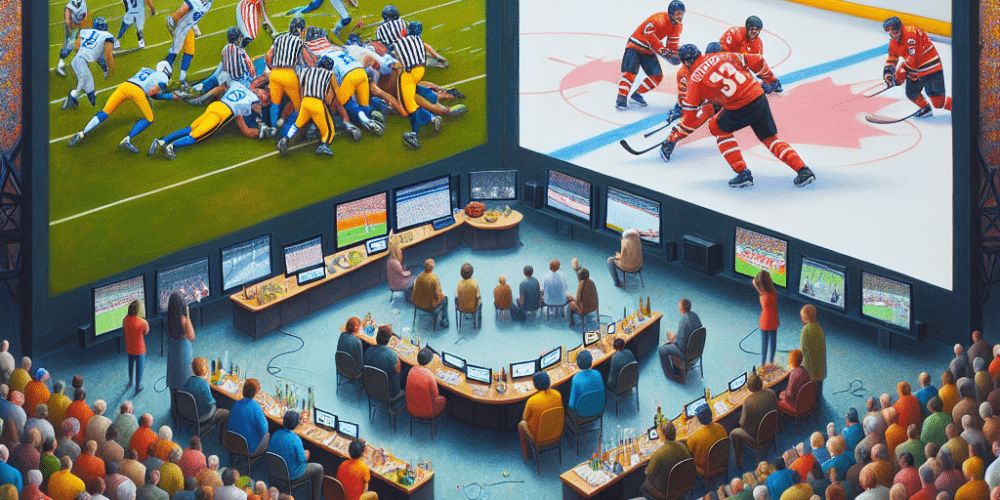A recent study by Leger reveals a significant disparity in sports betting popularity between the United States and Canada. Conducted online from August 29 to 31, 2025, the study surveyed 1,621 Canadians and 1,015 US residents aged 18 and older, randomly selected from LEO’s online panel.
In the past year, 19% of Canadians reported placing sports bets, compared to 26% of Americans. This is a decline from the previous year, where 21% of Canadians and 30% of Americans engaged in sports betting. The study further indicates that sports betting and fantasy sports participation remain more prevalent in the US, with fantasy sports leagues attracting 18% of Americans, versus 14% of Canadians.
American participants are notably more inclined toward alternative betting forms. They engage in micro betting, exchange betting, and eSports betting at higher rates and are nearly twice as likely to participate in live betting compared to Canadians. Specifically, 39% of American bettors placed live or in-play bets last year, whereas only 22% of Canadian bettors did the same.
The NHL retains its position as the most popular sport for betting and fantasy sports among Canadians. Over the past year, 41% of Canadian sports bettors wagered on NHL games. In comparison, bets on the NFL and NBA were made by 26% and 21% of Canadian bettors, respectively. Additionally, 32% of Canadian fantasy sports participants engaged in NHL fantasy hockey.
In contrast, the NFL continues to be the favored sport for both betting and fantasy sports among Americans. In the past year, 52% of American fantasy sports players took part in NFL fantasy football, and 59% of American sports bettors placed bets on NFL games. Meanwhile, NFL betting in Canada declined, with only 26% of Canadian sports bettors wagering on the NFL, down from 37% the previous year.
The perception of sports betting advertisements varies significantly between the two countries. Canadians express a higher degree of frustration with the sheer volume of these ads, with 75% reporting feeling overwhelmed. In the US, 59% share this sentiment, an increase from 52% last year. This difference in perception may influence the overall engagement in sports betting activities across the two countries.
Moreover, Canadians express stronger opposition to partnerships between sports media companies and betting firms, with 51% disagreeing with such collaborations compared to 30% of Americans. This has led to political discussions in Canada about potentially restricting betting advertisements, reflecting a broader cultural resistance to the commercialization of sports betting.
Despite these differences, both Americans and Canadians show increased willingness to place bets when provided with real-time information. Approximately 49% of bettors in both nations indicated that seeing live odds on screen makes them more likely to place a bet during a game. This trend highlights the role of technology and information availability in shaping betting behaviors.
With pending legislative changes in both countries, the landscape for sports betting is poised for potential shifts by the end of 2026. These changes could either ameliorate or exacerbate existing disparities in sports betting habits between the US and Canada. As the industry evolves, it remains to be seen whether cultural attitudes will shift or if these differences will persist.
A second viewpoint considers the potential impact of cultural differences on sports betting habits. Americans, known for a more competitive sporting culture, might naturally gravitate towards engaging more actively in sports-related activities, including betting. This contrasts with Canadian bettors who may approach betting with more caution, influenced by a culture that prioritizes moderation and regulation.
Industry experts suggest that the proliferation of advertisements and partnerships in the US has also normalized sports betting, potentially explaining the higher engagement rates. Meanwhile, Canada’s more conservative approach to advertising might contribute to the lesser popularity of sports betting, as regulations limit the exposure and perceived acceptability of betting activities.
As these dynamics play out, it will be critical for stakeholders to consider both cultural and regulatory factors in shaping the future of sports betting in North America. Whether through increased advertising restrictions in Canada or legislative support in the US, the evolution of sports betting will be one to watch closely as both markets continue to expand and adapt to changing consumer preferences.

Garry Sputnim is a seasoned journalist and storyteller with over a decade of experience in the trenches of global news. With a keen eye for uncovering stories that resonate, Alex has reported from over 30 countries, bringing light to untold narratives and the human faces behind the headlines. Specializing in investigative journalism, Garry has a knack for technology and social justice issues, weaving compelling narratives that bridge tech and humanity. Outside the newsroom, Garry is an avid rock climber and podcast host, exploring stories of resilience and innovation.
















